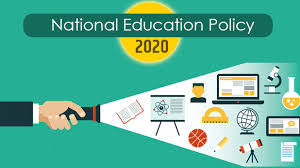Union Government to launch two-month outreach on Education policy
The Union Government is planning to launch a two-month-long national outreach program on the new National Education Policy (NEP) to bring on board all the stakeholders, including states and institutions so that they can understand the details of the policy and its structural reforms. The advantages and the facilities under this policy will also be explained through this outreach program.
Background
The Union Government unveiled the New Education Policy on July 29, after 34 years. The policy aims at revolutionizing the education sector in the country and wants to inculcate the values of critical thinking among the children. Keeping that in mind, it has made the structure from 10+2+3 to 5+3+3+4 and also regional language has been made mandatory in the lower levels of education. For the recruitment of teachers, a professional roadmap has been proposed to be developed by the NCERT. All these changes are to be explained in detail to all the stakeholders through the outreach program of the government.
Details of the Outreach Program
The state units of the Press Information Bureau are likely to conduct the virtual symposiums and talks whenever possible in the capital cities of the states. Apart from this, central institutes and universities in the various states are going to be made the nodal centres for outreach programs in colleges and universities where the academics, experts and education authorities will speak about the NEP and the actual objective of such reforms.
What is the Status of School Education in India?
As of the Annual Status of Education Report 2018, in India, the overall enrolment of children has been above 95% since 2017 and the children not enrolled in schools have fallen to 3% only. The dropout rate of the girls has also been reduced from around 10% to 4.1%. Substantial improvement has been observed in 2018 regarding the facilities being provided in schools across the country as mandated under the RTE Act. The percentage of schools with usable girls’ toilets doubled from 2010, reaching 66.4% in 2018. The percentage of schools with books other than textbooks has also seen a jump from 62% to more than 74% within 8 years from 2010 to 2018.
Right to Education Act, 2009
This act is meant to provide free and compulsory education to children and it is enforced as a fundamental right under the Article 21A of the Indian Constitution. This has been added as per the 86th Constitutional Amendment Act 2002. As per the act,
- Primary Education to all children is necessary for children between 6-14 years of age.
- Education has been made a fundamental right now.
- 25% reservation for disadvantaged sections has been maintained in the schools.
- A non-admitted child can be admitted to schools on age-appropriate basis.
- The financial responsibilities are shared between the central government and the state governments.
Month: Current Affairs - August, 2020


